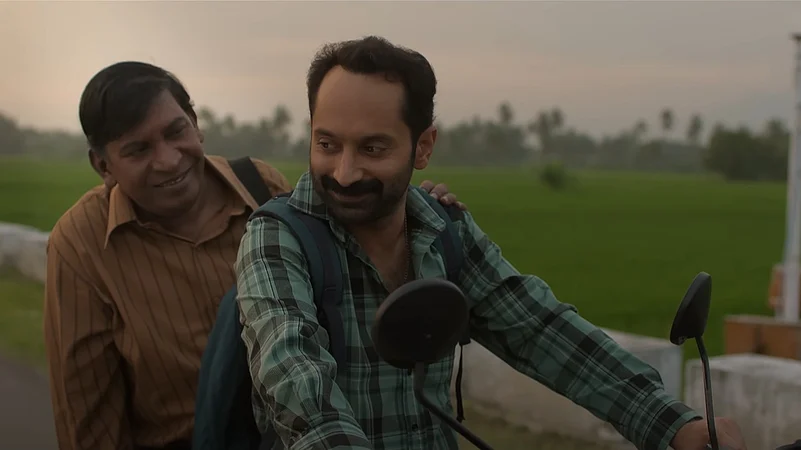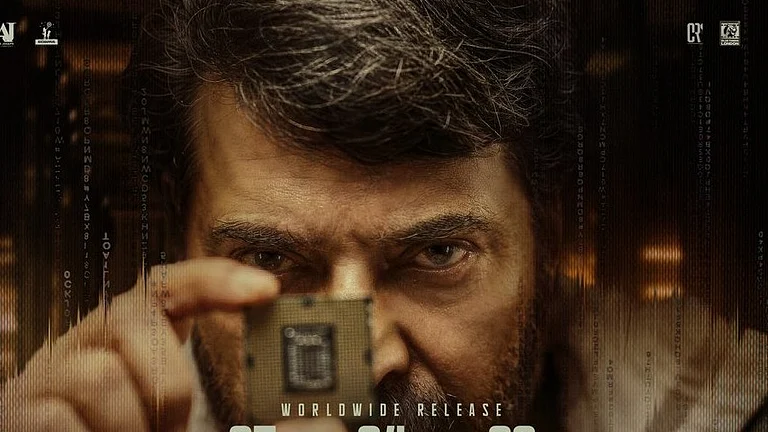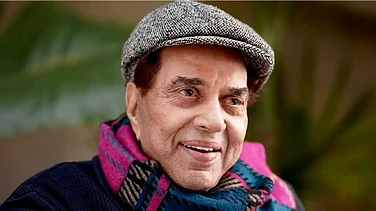
Summary of this article
A petty thief convinces an Alzheimer's patient to go on a road trip.
Halfway through, the road trip turns into a sinister crime thriller.
Fahadh Faasil and Vadivelu hold the movie together despite the plotholes.
The first half of Sudheesh Sankar’s Maareesan begins like a Malayalam buddy movie, tenderly anchored in the effortless chemistry between a just-released-from-prison thief Dhayalan (Fahadh Faasil) and Velayudham (Vadivelu), an Alzheimer’s patient who mistakes him for his son. In his serendipitous encounter with Velayudham, Dhaya feels a ‘connection’ with the home in Nagercoil in which he is housed (in handcuffs, no less). Velayudham tells him that his son is trying to restrain him and asks Dhaya to set him free, promising him money. Dhaya has begun thieving again after his release—first a mobile phone, then a motorcycle—and sees in Velayudham an opportunity to strike big. When he learns of Velayudham's substantial bank balance of Rs. 25 lakh, greed takes over. He convinces the Alzheimer's patient to venture out on a road trip on his newly stolen motorcycle, plotting to rob him further.
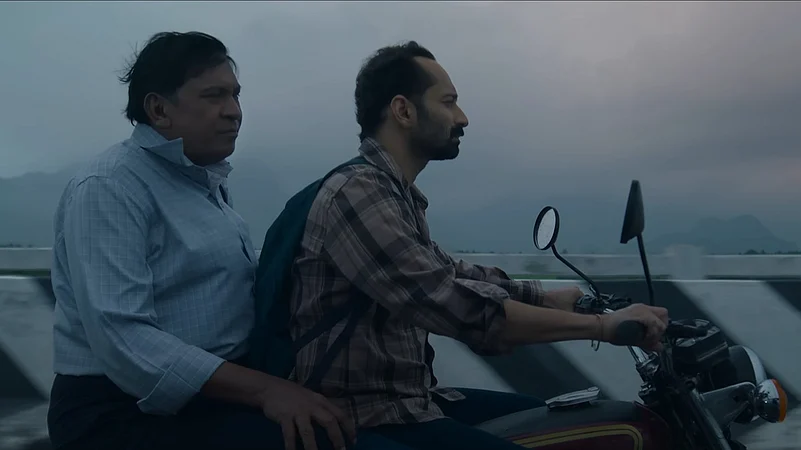
They proceed to Tiruvannamalai, traversing highways through Kalaiselvan Sivaji’s lens, hitting goats, fumbling with ATMs and PINs, and bonding over alcohol at motels, while the film finds its footing.
With an upbeat background score by Yuvan Shankar Raja, one makes peace with the languid pace and the meandering, hoping that something will happen. The camaraderie between FaFa and Vadivelu is enjoyable, as they play this game of forgetting and reminding.
Like many movies, Maareesan uses Alzheimer’s to keep you on your toes, particularly in the first half—through mistaken identities, ATM pins, bags of money and diary entries (up to a point, I was keeping track of ATM withdrawals and who gave how much to whom, but then they made it unnecessarily confusing).
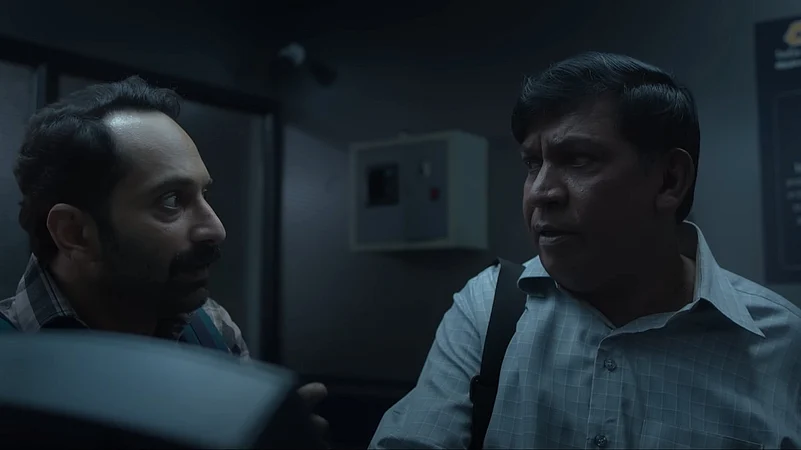
It’s charming to watch the rapport unfold between Dhaya and Velayudham and even the most mundane conversations manage to hold our attention as they glide through Madurai, Tiruvannamalai, Palakkad and Coimbatore on the bike. There is a warmth to the build-up of their friendship through reflection and sharing, such as Velayudham’s: “Alzheimer’s helps me live in the moment” to which Dhaya says, “Living is remembering.”
For a movie titled Maareesan—a rakshasa character in the Ramayana, an ally of Ravana who takes the form of a deer in order to kidnap Sita—we are forewarned that demons may emerge.
Once the emotional equation between the two men is established, the screenplay goes into a freeze and doesn’t know what to do with them. It takes a special actor to take lazy material (the writing by V. Krishna Moorthy is patchy and regressive) and make it one’s own. Both FaFa and Vadivelu could well have been in an acting improv class, spinning dialogues as they feel their way through, taking cues from each other’s body language, adding movements and mannerisms to take our attention away from the words.
Yet, nothing prepares you for the clumsy U turn of the second half, where the demons emerge in more ways than one. Just as you get invested in the two and expect a sort of Meiyazhagan (2024) narrative (of two people getting to know and understand each other, exchanging life lessons as the plot unravels), without warning, the second half devolves into a vigilante thriller—featuring sexual predators, paedophiles, suicide, misogyny and revenge; serving up trauma as a condiment. Meanwhile, Dhaya finds ethics and morals and Velayudham finds crime and revenge. Yet, they still circle around each other until the end.
There are some lovely comic moments in the first half—FaFa leaving a movie hall midway in order to steal a bike from the parking lot for his shenanigans. As the guard asks him why he isn’t staying till the end, he says, “Amma is unwell, I have to rush”. Or FaFa randomly checking out cars in a showroom and the salesman asking—“Are you buying or only seeing?” To which he says, “First I will see, then buy.” There is also a poignant moment when they make a stop to visit Dhaya’s mother in the village.
In the second half of some extremely long and wasteful scenes, you are just waiting for FaFa to make an entry again.
For those who follow his Malayalam cinema, FaFa’s quirks and mannerisms are immensely recognisable and draw you in (I was reminded of his chain swallowing in Thondimuthalam Driksakshiyum (2017), an absolute riot of a movie). He skilfully navigates Dhaya’s transformation from an opportunistic criminal to someone who is capable of genuine human connection.
Vadivelu maintains his character's inherent dignity throughout, departing from his usual comedic persona on screen to embrace a more nuanced body language that serves the story's emotional weight. FaFa and Vadivelu earlier shared a great onscreen chemistry in 2023’s Maamannan.
If you walked away after the first half, the movie could still have lived in your memory as a possibility. For its excessive plot-holes and absurdities,
Maareesan could be an interesting cast study at film school—where students are asked to extrapolate the first half into a meaningful second.
Things and thugs, blood and bodies are simply thrown into the narrative and dealt with in an extremely superfluous way, as if they had to exhaust all the ingredients of plot into the last hour. In an underwhelming climax, the police arrive from all quarters, as if to cut a ribbon. Thankfully, Dhaya and Velayudham add some soul to the ending.
The premise—of two criminals finding kinship in their damaged moral compasses, each justifying their crimes through different lenses—is a great one for a film. There are moments when the film is in acceptance of its contradictions and lets them breathe. But it’s not always easy for two films to live as one, which is the biggest problem with Maareesan.



